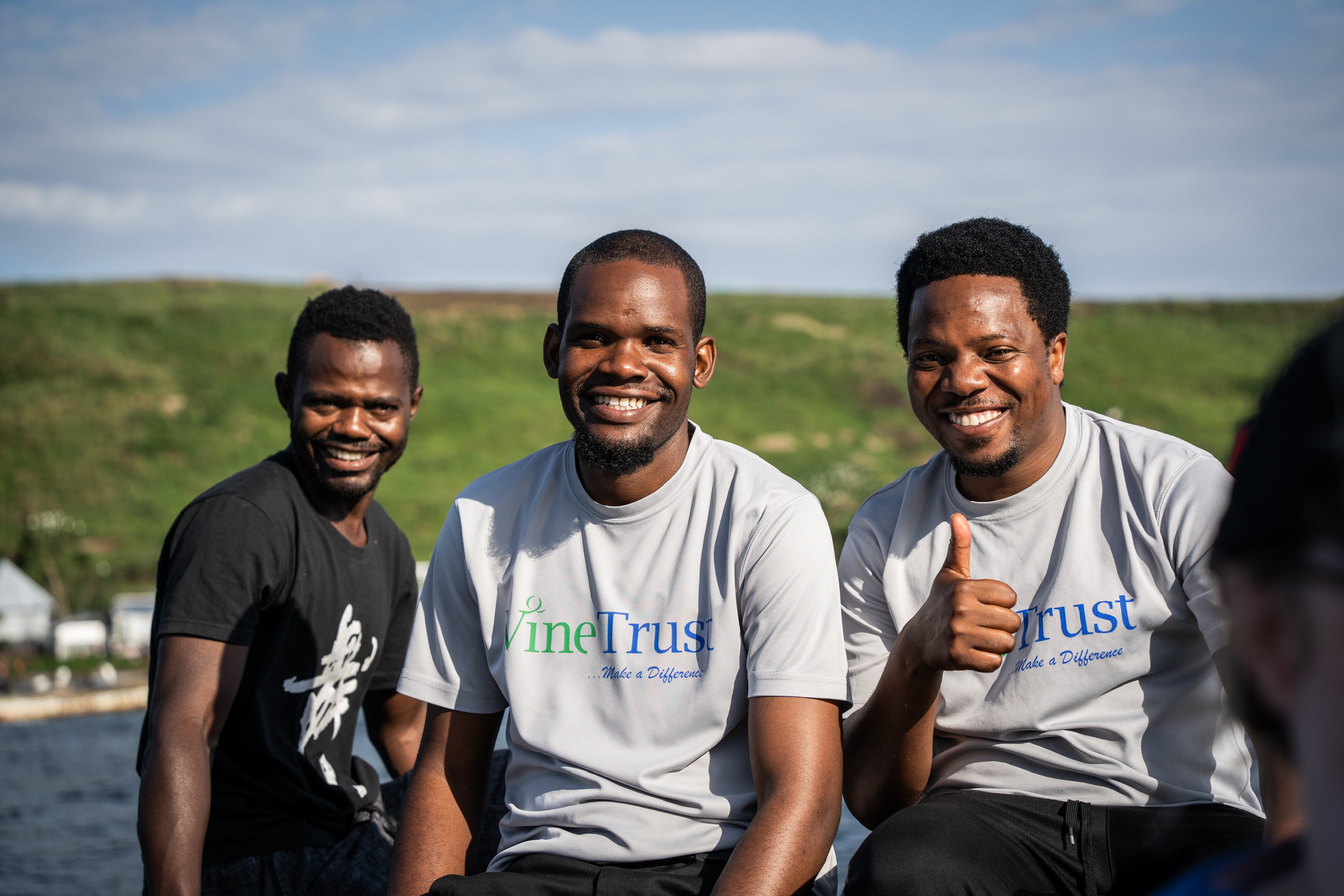About Our Principles
Vine Trust supports long-term international partners as they use sustainable international development practices to strengthen health systems and implement construction programmes in Peru and Tanzania.
We also run expeditions that enable volunteers to actively and practically contribute to the exceptional work that our in-country partners are doing to empower their local communities, giving these volunteers the invaluable opportunity to interact with community members and project workers in a way that inspires mutually empowering and long-lasting relationships.
Volunteers can experience first-hand the positive impact of sustainable international and community development practices, whilst our partners gain new international advocates for the work they’re doing in Peru and Tanzania.
It’s not just ‘what’ you do…
Since it was first established in 1985 as a response to the famine in Ethiopia, Vine Trust has developed the scope and focus of its work.
One thing has remained consistent throughout our journey: as a charity, we’ve always sought to find the most suitable way of providing assistance to our in-country partners, recognising that the nature of this support may need to adapt over time due to shifting socio-cultural, economic, and environmental contexts.
In order to better understand and prepare for these shifts and adaptations, Vine Trust develops and maintains transparent and constructive communication with its partners and engages in regular reviews of its operational and strategic planning.
As well as prioritising the importance of ongoing communication with our partners, we also believe firmly that it’s not just “what” you do but also “how” you do things that is the key to the success of development programmes and projects.
To put it another way, it’s about recognising that the “ends” don’t justify the “means” if those “means” aren’t ethical, sustainable, or constructive. Rather, it’s equally if not more important to consider the way in which a project is run rather than focussing purely on the outcomes.
We never seek to drive the work that our partners do; rather, we aim to help our in-country teams achieve their own community goals through playing an active, adaptable, and supportive role in the process.
Our Principles were developed through review and analysis of our existing work, research into global development themes as well as extensive discussion and engagement with a wide range of stakeholders, including our partners in Peru and Tanzania.
They underline and reflect the approach that we strive to take in all facts of the charity, from fostering relationships with our partners to strengthening our volunteers’ experience on their expeditions and creating a non-discriminatory and inclusive workplace environment on the barge (our UK base in Leith, Edinburgh).



The Principles
1. Our Christian ethos shapes how we work. We welcome everyone without discrimination regardless of faith, colour, race, sexual orientation, gender or any other distinction
- Vine Trust originated from a church fundraising response (St Andrews Church of Scotland Bo’ness) to the famine in Ethiopia in 1985.
- These same values of action, empathy, fairness and respect still motivate the activities of Vine Trust today.
- All aspects of Vine Trust’s work, including its partnership programmes in Peru and Tanzania, take place without discrimination of any kind, either on race, colour, language, ethnicity, religion, political, disability, age, marital status, family status, sexual orientation and gender identity, or any other distinction.
2. Partnerships and respect are at the core of who we are and how we operate. We develop trusting, transparent and mutually-accountable, long-term partnerships
- Partnerships are fundamental to everything Vine Trust does.
- We believe partnerships require taking a long-term approach, with an emphasis on approaching these connections with respect, trust, transparency, and honesty.
- Vine Trust supports and invests in programmes that bring together multiple people with different skills, expertise, and perspectives.
- We believe that accountability and responsibility in development partnerships are two-way, mutual values in practice.
- Vine Trust has a responsibility to the all different stakeholders that are impacted by or involved in the activities of its partnership programmes.
- The work of Vine Trust is guided by the respective legislation, codes and standards of practice in the UK, Tanzania, and Peru.
3. We empower local partners, respecting their culture and acknowledging they are best placed to shape and drive the work. We seek to understand the power dynamics that exist and work towards equality within partnerships.
- Vine Trust recognises and respects the value, dignity, strength and resilience of our partners and the communities in which they work, without underestimating the reality of the sociocultural, economic, and environmental challenges they face.
- We seek to constantly develop our understanding of the multi-dimensional cultural and socio-economic contexts and dynamics at play for our in-country partners, including the underlying roots of the challenges which they face and not merely the outcomes of these challenges.
- We appreciate that our partners and their communities have the unique understanding, knowledge, skills and expertise which must have a principal role in developing and driving forward any programme.
- Vine Trust seeks to empower our in-country partners through transferring budgetary control, providing financial and capital resources, developing training and capacity building opportunities, lending technical support, guidance and encouragement, and introducing opportunities for networking and collaboration.
- We recognise that power dynamics exists in the partnerships and are committed to take steps to address these in the most appropriate way.
4. We enable ethical volunteering which supports global citizenship.
- Vine Trust is passionate about ethical volunteering due to the many reciprocal benefits it provides for both our partners and their communities, as well as our volunteers and their communities.
- Vine Trust promotes volunteer opportunities which:
- are designed and implemented by the leadership of in-country personnel
- benefit both the local programme and the volunteer,
- encourage country-to-country volunteering as well as in-country volunteering
- emphasise the importance of informing volunteers about these programmes’ objectives and their own role in helping to achieve these goals.
- nsure volunteers are informed about the programme’s objectives and their role.
- Mechanisms and systems are in place for monitoring and evaluating the impact and role of volunteers. All negative consequences must, and will, be identified and addressed.
- Vine Trust works with partners to develop programmes that can benefit from volunteer support and participation but that are not dependent upon this dynamic.
- When it comes to the volunteering experience, Vine Trust ensures that appropriate safeguarding measures, which have been developed through input from all stakeholders, are in place.
5. We care about impact and sustainability in all aspects of our work. We are committed to safeguarding and ensuring that our work does no harm.
- Vine Trust strives to run programmes and activities that are environmentally, socially and economically sustainable.
- We recognise that the challenges of climate change are complex and multidimensional, and we seek to understand the environmental impact of all programmes and activities (e.g. air travel), taking suitable steps to mitigate any negative aspects of this impact.
- Positive social impact can only come about by engaging with our in-country partners and their communities in a constructive and ethical way. Positive economic impact is never the sole objective of our charity’s work and must never be at the expense of environmental or social factors.
- Vine Trust works with our in-country partners to collaborate on and support research that identifies the needs of, measures the impact on, and monitors the progress within local communities. We see research collaboration as a powerful tool for strengthening partnership ties and building reciprocal learning capacity.
- Any of our collaborative research activities are approved by the Peruvian and Tanzanian ethics authorities, with Peruvian and Tanzanian personnel holding key positions. The results of research are communicated appropriately to the communities as well as to the local, regional, and national authorities.
- Vine Trust believes that the safety and welfare of all people connected with our programmes and projects are of the utmost importance.
- Any and all safeguarding systems put in place must, as a priority, include substantial input from those that they are designed to protect.